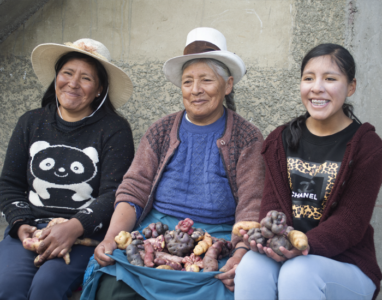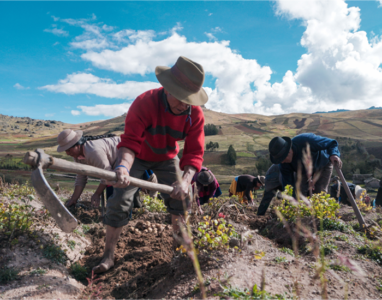
CGIAR launched seven initiatives in Peru this month in an event in the city of Lima, where approximately 90 representatives of public institutions, international and national organizations and the private sector learned about the initiatives and their potential to boost food security and incomes in some of the country’s poorest communities.
Scientists from several CGIAR centers outlined the initiatives and plans to strengthen collaboration with Peruvian research institutions, generate innovations, and facilitate investments that could eventually increase employment opportunities and the availability of nutritious food for millions of low-income families.
“We’re going to work through these initiatives with all our partners in Peru, the public sector, research, academia, international organizations, the private sector and, especially, small-scale farmers,” said Joaquín Lozano, CGIAR Regional Director for Latin America and the Caribbean.
“Collaboration is essential, it will allow us to ensure that these initiatives transform agrifood systems so that they become more resilient and responsible, help us face the food crisis together and, above all, take care of the environment,” he continued.
The event included the participation of Peru’s Minister of Agrarian Development and Irrigation, Patricia Ocampo, who applauded the integration of CGIAR research centers in OneCGIAR and expressed her gratitude for the decision to implement seven initiatives in Peru. She said they will provide the country with science, technology and knowledge to face new challenges.
“I have always admired the work of researchers. They are probably unsung heroes because they aren’t the ones who appear on newspaper covers every day, yet every day we feed ourselves with the products of their research,” Minister Ocampo said. “We all hope that the results of this type of alliance with CGIAR can contribute to food security across the planet.”
Initiatives for impact
Deissy Martínez, leader of AgriLAC Resiliente, one of the seven initiatives launched in Peru, explained that its objectives include strengthening family farming and food security, and making agrifood systems more sustainable and resilient in the face of change.

“The implementation of these initiatives represents a unique opportunity to make the science and knowledge of the entire CGIAR available to the country,” Martínez said.
Stef de Haan, country coordinator for the seven new Initiatives and leader of the Andean Initiative, explained that Peru is an exceptional country with 30% of the planet’s biodiversity, which includes a wealth of agrobiodiversity, since it lies in the center of origin of the potato and other crops.
“There are many opportunities for these CGIAR initiatives in Peru,” said de Haan, who explained that their complementary approaches allow for a comprehensive agenda to contribute to the country. “We just have to ensure that it isn’t top-down, not just us scientists with our agendas, but rather create an enabling environment for co-innovation with local people.”
Minister Ocampo was enthusiastic about the prospects of CGIAR’s innovations and approaches. “I am more than certain that these initiatives will make great contributions to our country,” she said.
These are the seven initiatives launched in Peru and a CIP initiative that began earlier:
- AgriLAC Resiliente, to increase the resilience, sustainability and competitiveness of agri-food systems and actors in Latin America and the Caribbean.
- Resilient Cities, to support a vibrant urban and peri-urban agriculture and food sector and improve sustainability, equity and income opportunities.
- Plant Health,. to help 3 million small farmers in 10 countries to protect their crops from pests and diseases and reduce the use of toxic agrochemicals.
- Excellence in Agronomy, to achieve an increase in productivity and quality per unit of input for millions of households of small farmers.
- Accelerated Breeding, to develop better-yielding crop varieties preferred by farmers and that provide adaptation to climate change, evolving markets and production systems.
- Genebanks, to support the world system for the conservation and use of plant genetic resources for food and agriculture.
- Agroecology, to develop and scale up agroecological innovations with small farmers and other
